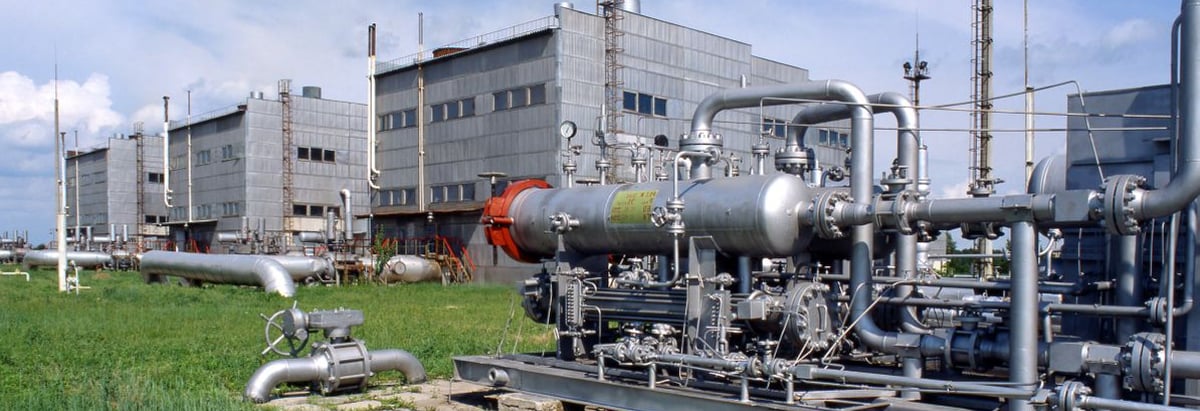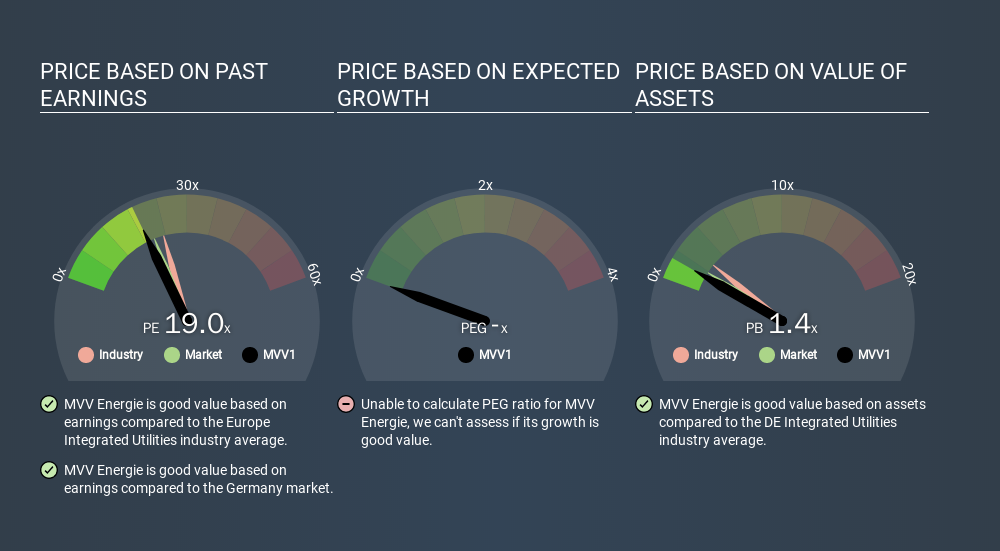
This article is for investors who would like to improve their understanding of price to earnings ratios (P/E ratios). We'll apply a basic P/E ratio analysis to MVV Energie AG's (ETR:MVV1), to help you decide if the stock is worth further research. MVV Energie has a price to earnings ratio of 19.00, based on the last twelve months. That is equivalent to an earnings yield of about 5.3%.
Check out our latest analysis for MVV Energie
How Do You Calculate A P/E Ratio?
The formula for price to earnings is:
Price to Earnings Ratio = Share Price ÷ Earnings per Share (EPS)
Or for MVV Energie:
P/E of 19.00 = EUR28.70 ÷ EUR1.51 (Based on the trailing twelve months to December 2019.)
Is A High P/E Ratio Good?
A higher P/E ratio means that buyers have to pay a higher price for each EUR1 the company has earned over the last year. That isn't necessarily good or bad, but a high P/E implies relatively high expectations of what a company can achieve in the future.
Does MVV Energie Have A Relatively High Or Low P/E For Its Industry?
The P/E ratio essentially measures market expectations of a company. If you look at the image below, you can see MVV Energie has a lower P/E than the average (23.8) in the integrated utilities industry classification.

MVV Energie's P/E tells us that market participants think it will not fare as well as its peers in the same industry. Since the market seems unimpressed with MVV Energie, it's quite possible it could surprise on the upside. It is arguably worth checking if insiders are buying shares, because that might imply they believe the stock is undervalued.
How Growth Rates Impact P/E Ratios
Companies that shrink earnings per share quickly will rapidly decrease the 'E' in the equation. Therefore, even if you pay a low multiple of earnings now, that multiple will become higher in the future. Then, a higher P/E might scare off shareholders, pushing the share price down.
MVV Energie's 279% EPS improvement over the last year was like bamboo growth after rain; rapid and impressive. Regrettably, the longer term performance is poor, with EPS down -6.6% per year over 3 years.
Don't Forget: The P/E Does Not Account For Debt or Bank Deposits
Don't forget that the P/E ratio considers market capitalization. That means it doesn't take debt or cash into account. Theoretically, a business can improve its earnings (and produce a lower P/E in the future) by investing in growth. That means taking on debt (or spending its cash).
While growth expenditure doesn't always pay off, the point is that it is a good option to have; but one that the P/E ratio ignores.
MVV Energie's Balance Sheet
Net debt totals 71% of MVV Energie's market cap. If you want to compare its P/E ratio to other companies, you should absolutely keep in mind it has significant borrowings.
The Bottom Line On MVV Energie's P/E Ratio
MVV Energie has a P/E of 19.0. That's below the average in the DE market, which is 20.9. The company may have significant debt, but EPS growth was good last year. The low P/E ratio suggests current market expectations are muted, implying these levels of growth will not continue.
Investors should be looking to buy stocks that the market is wrong about. If it is underestimating a company, investors can make money by buying and holding the shares until the market corrects itself. Although we don't have analyst forecasts you could get a better understanding of its growth by checking out this more detailed historical graph of earnings, revenue and cash flow.
But note: MVV Energie may not be the best stock to buy. So take a peek at this free list of interesting companies with strong recent earnings growth (and a P/E ratio below 20).
If you spot an error that warrants correction, please contact the editor at editorial-team@simplywallst.com. This article by Simply Wall St is general in nature. It does not constitute a recommendation to buy or sell any stock, and does not take account of your objectives, or your financial situation. Simply Wall St has no position in the stocks mentioned.
We aim to bring you long-term focused research analysis driven by fundamental data. Note that our analysis may not factor in the latest price-sensitive company announcements or qualitative material. Thank you for reading.
About XTRA:MVV1
MVV Energie
Provides electricity, heat, gas, water, and waste treatment and disposal products primarily in Germany.
Excellent balance sheet established dividend payer.
Similar Companies
Market Insights
Community Narratives



